‘I was so lucky’: A gay son honors his dads lost to AIDS
Sometimes, Noel Arce has trouble remembering his dads.
Not his biological parents — he never met them: His birth mother gave him up as an infant, and he never knew who his birth father was.
But in 1988, he and his brother, Joey, were taken in by Louis Arce and Steven Koceja, a gay couple from Manhattan. Louis was a social worker, and Joey, 2, and Noel, about 10 months old, were in the foster care system.
The boys had been surrendered at New York City’s Metropolitan Hospital. “Our mother and dad were heroin addicts, and they couldn’t really care for us,” Noel said.
During the week, the brothers and Angel, an HIV-positive 3-year-old, lived with Louis and Steven in their Manhattan apartment, and on weekends, they went to the couple’s house in the scenic town of Rosendale, New York, about two hours north.
“It felt very normal, my childhood,” Noel said. “Like the world operated with moms and dads, and two dads and two moms.”
Noel was always free to be himself growing up — to play with Barbie dolls and dress up in frilly costumes. His dads loved to make home movies; in one, Joey and Angel are playing with Tonka trucks and Noel is picking flowers.
“I was very feminine. I’d always participate in girly things, and my dads embraced that in me,” he said. “That really helped me in my development as a child,”
As he got older, Noel realized that was a unique experience.
“I hear people’s stories of coming out and being rejected, being thrown out. That experience for most gay men is a very hard one,” he said. “I’m very blessed to not have had that.”
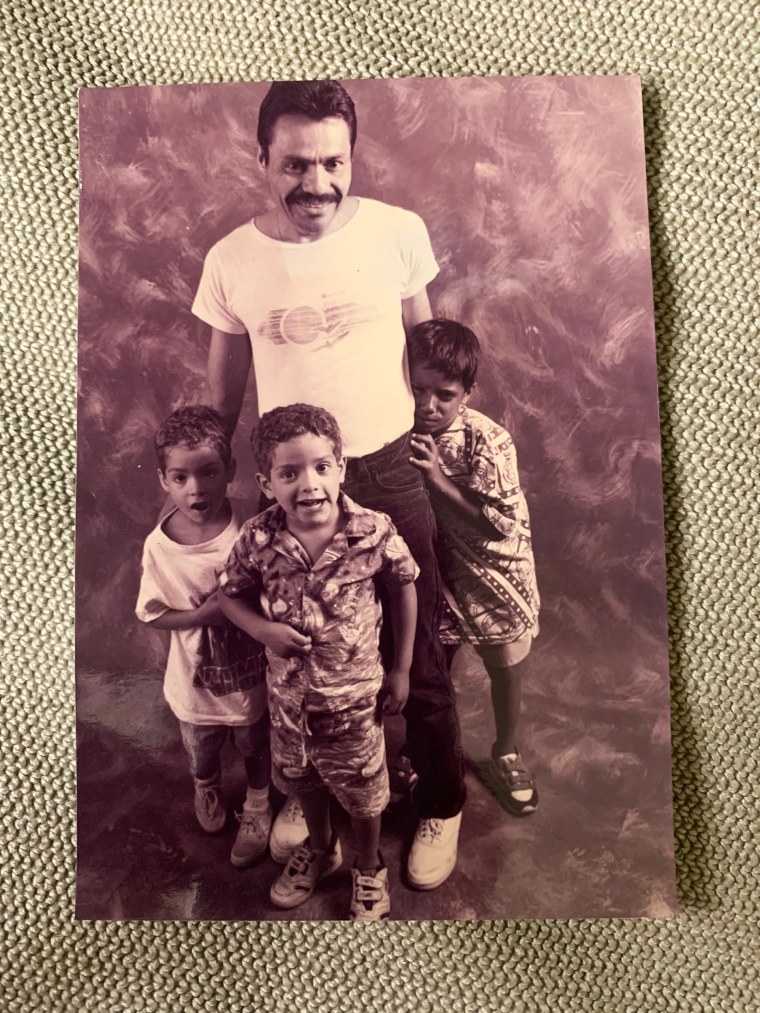
The time they had together was special, but it was all too brief. Joey and Noel’s adoptions were finalized in 1993. On June 18, 1994, Steven, 32, died of AIDS-related complications. Five days later, Louis, 47, succumbed to the disease.
Noel was just 7 at the time.
Now 33, he says some of the memories of his time with Louis and Steven are fuzzy. He compares them to a train leaving the station, getting smaller and smaller as it pulls away.
Some moments, though, are crystal clear.
“When I look at some of the photos I have, I can remember the day the picture was taken,” he said. “When I see the bedroom, I can remember being there, I remember certain smells — what was cooking that day. And I remember all the Barbies I had.”
One memory in particular stands out: Noel had just turned 6, and, as usual, the family was making a video. “It was like a horror movie, but, you know, silly,” he said. “I dressed up as a witch, and my brother was, like, a devil. And my dad was videoing it, and we were all having so much fun.”
As an adult, he says, he’s better at holding onto the memories. “But I don’t remember the end. I don’t remember them being sick. I don’t remember visiting them in the hospital.”
When Louis and Steven knew their time was running out, they recorded special videos for the boys.
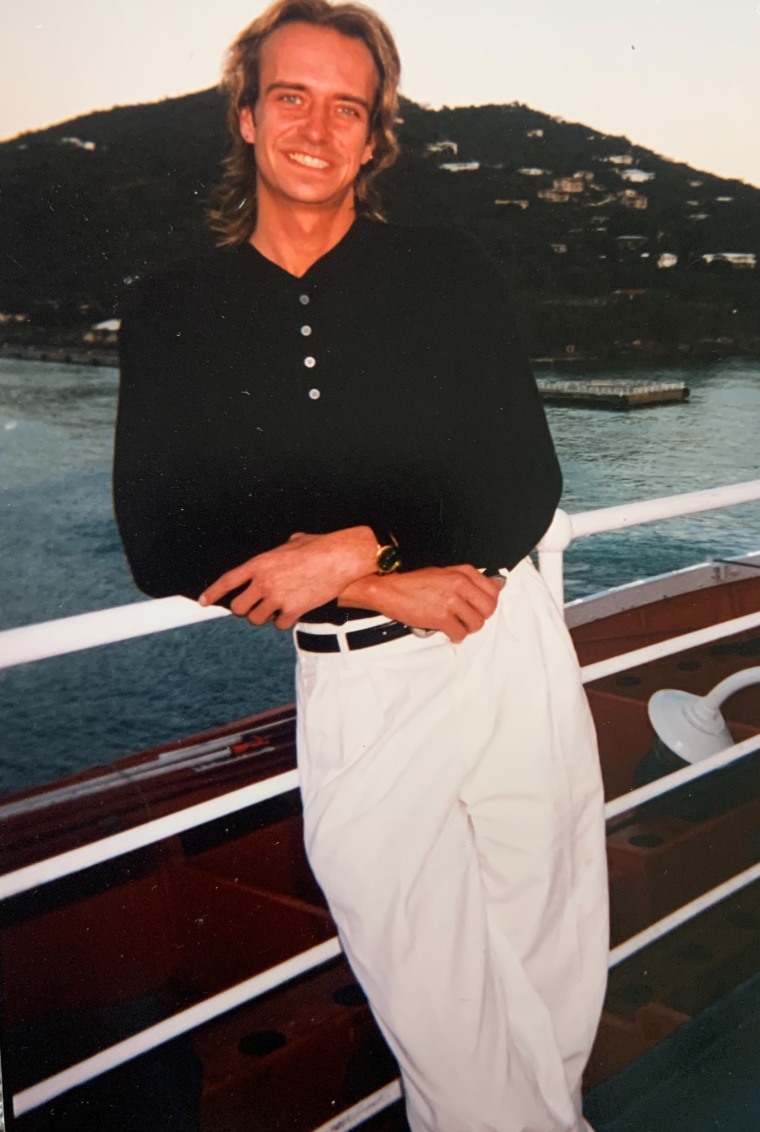
“There’s a video of them talking to us — explaining how much they loved us,” Noel said. “And there’s videos Louis made for each of us individually. In the video for me, he says, ‘Noel, I know you’re gay.’ And he gives me his thoughts and advice about facing life. I’m so lucky to have that.”
He watched that video for the first time a year after his dads died and, unsurprisingly, didn’t really understand it. About two years ago, he watched it again.
“It was the first time I had an emotional reaction — where I cried,” he said of watching the video.
After Louis and Steven died, Louis’ brother Robert and his wife, Tina, took in the three boys.
When Louis and Steven started to get sick, they had asked Robert and Tina to become the boys’ guardians and started transitioning care.
“Sometimes we’d come over for longer visits,” Tina said. “Other times it would just be the kids and us. We talked to them about what was going to happen, but how do you prepare a child for that?”
She and Louis had known each other since they were kids themselves. “He always, always wanted children,” she said. But, he was an HIV-positive man at a time when treatment options were minimal to nonexistent.
“I said to him, ‘Why would you do this to these kids — taking them in, knowing you have a death sentence, that you’ll disappear on them?” And he said, “Who would know better than me what they’ll face?”
Bringing the boys into the family “changed our whole dynamic forever,” she said. “I was done raising kids by that point, and then there I am, taking these” children in.
But she got much out of the experience, too, she’s quick to add, “maybe even more than the kids.”
“I became involved in AIDS care. I traveled. I met people I never thought I would. I fought for them,” she said. “The man upstairs knew what he was doing bringing us together. It was amazing how my life turned around. If it wasn’t for our family, I don’t know what I’d do.”
Noel, who lives with Robert and Tina in Suffolk County, New York, said he and Joey, who lives nearby, are still very close. Sadly, he doesn’t know what became of Angel, whom he said developed serious emotional problems in adolescence and had to be taken out of the family.
“I don’t know if he’s alive,” he said. “Back then, AIDS was a death sentence. But with the way medication is today, I hope he’s OK — and that he’s happy.”
Noel’s mother was HIV-positive when she was pregnant, and he tested positive for the virus at birth. Eventually, though, he developed his own antibodies and was determined to be HIV-negative.
In April, Noel shared a photo of Joey, Angel, Louis, Steven and himself on the AIDS Memorial Instagram, a page dedicated to sharing stories of those lost to the pandemic.
“We weren’t with Louis and Steven very long before they passed,” he wrote in the accompanying caption. “They never got a chance to see the men we are today but they cared for us very much and gave us a life that we wouldn’t have known otherwise. It’s incredible even now, after all these years, I can still feel what it felt like to be loved that much.”https://iframe.nbcnews.com/VhRU9be?app=1
The black and white image included in the Instagram post was from an early ‘90s photo shoot for “Living Proof: Courage in the Face of AIDS”, a collection of portraits published in 1996 by photographer Carolyn Jones of people from all walks of life living with HIV/AIDS.
“I remember the family well,” Jones said of the shoot. “There were not that many families photographed for “Living Proof,” so they are easy to remember. Those three little boys were priceless together. It felt as though they had all somehow miraculously found one another, and there was a lot of love wrapped up in that photo.”
Noel’s post has received hundreds of comments and more than 15,000 likes.
He doesn’t remember how he first came across the AIDS Memorial Instagram account, which NBC News reported on in December for World AIDS Day.
“I think a friend of mine followed that account, and it got recommended to me,” he said. “But when I saw it, I was like, ‘Wow, all these people are telling their stories.’ And I just kind of felt compelled to tell my story, too.”
The response was tremendous, Noel said, adding that it has been particularly meaningful to see comments from people who hadn’t been directly affected by the AIDS devastation of the 1980s and ‘90s.
“I guess I thought that AIDS was a conversation people weren’t having anymore. That no one cared,” he said. “With young people today, they think, ‘Oh, we have medications, we have Truvada, and [HIV] isn’t something to really worry about, right?’ My fear is that it’ll completely be forgotten. But the page keeps it alive. It makes people remember our history and the people who fought for what we have now … And who even died in the process.”
Noel doesn’t know much about how Louis and Steven were able to take in HIV-positive boys in the late ‘80s. “I do know that they fought for us quite a bit,” he said. “I can only imagine how hard it was at that time.”
He has shared other family photos of his dads, his brothers and himself on social media. It’s comforting, he said, but it also churns up immense feelings of loss.
“God really handed me the courage to look at those pictures again,” Noel said. “It had been years — there’s a lot of pain attached to them. But it was a great childhood, it was. I look back now, and I’m like, ‘Wow, I was so lucky.’”
For the past 13 years, Noel has worked in drag, as Violet Storm, playing clubs in Manhattan and out on Long Island. The pandemic put a pause on gigs, but more recently he’s been able to perform again.
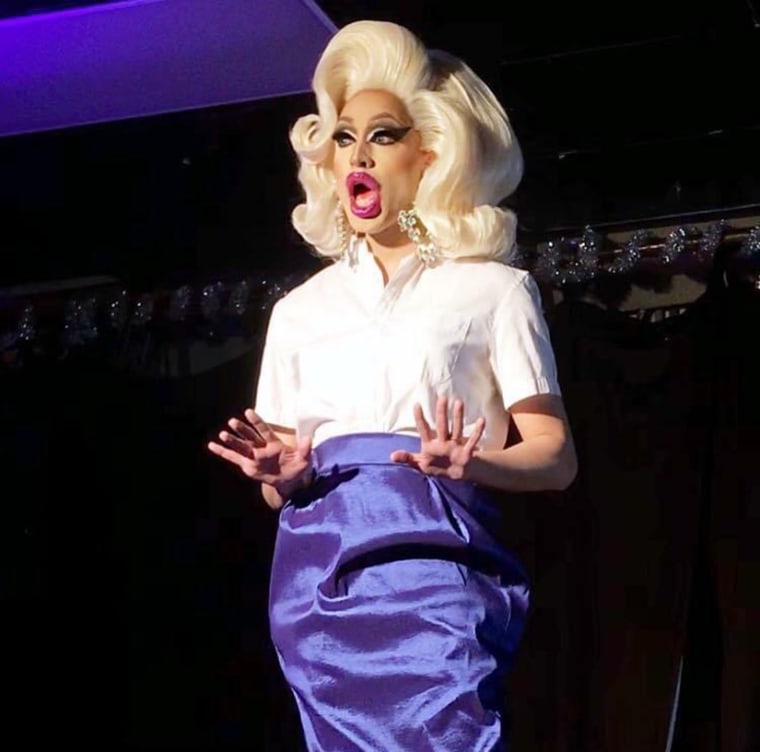
Knowing his dads were gay, Noel often wonders what they would think of his drag. “Not whether they’d approve of it, because of course they would,” he said. “But, would they think I’m funny? That I’m pretty? Would they like my show?”
He has a lot of questions about his dads that can’t really be answered.
“Like, how did they meet? I want to know the whole love story — I want to hear about those crazy feelings you have when you first meet someone,” he said. “What bars did they go to? Did they have a favorite drag queen? What kind of homophobia did they face back then?”
Tina has been a fount of information about his dads, “but this isn’t really stuff she can tell me.”
He recalled doing a show at the historic Stonewall Inn and wondering if Louis and Steven had gone there back in the ‘80s and ‘90s.
“Every time I do a show, I think, ‘Were my dads here? Did they like this bar? Who did they see perform?’ Sometimes I cry when I think about it,” Noel said. “But they give me a lot of courage, too. Before I go on, I get really, really nervous. And there’s a moment where I have to go on, and I think, ‘I’m just going to back out. I’ll leave. I just can’t do this.’ My heart is racing, I’m so nervous, and then I think of my dads, and I’m like, ‘Just do it. Just let it happen.’”
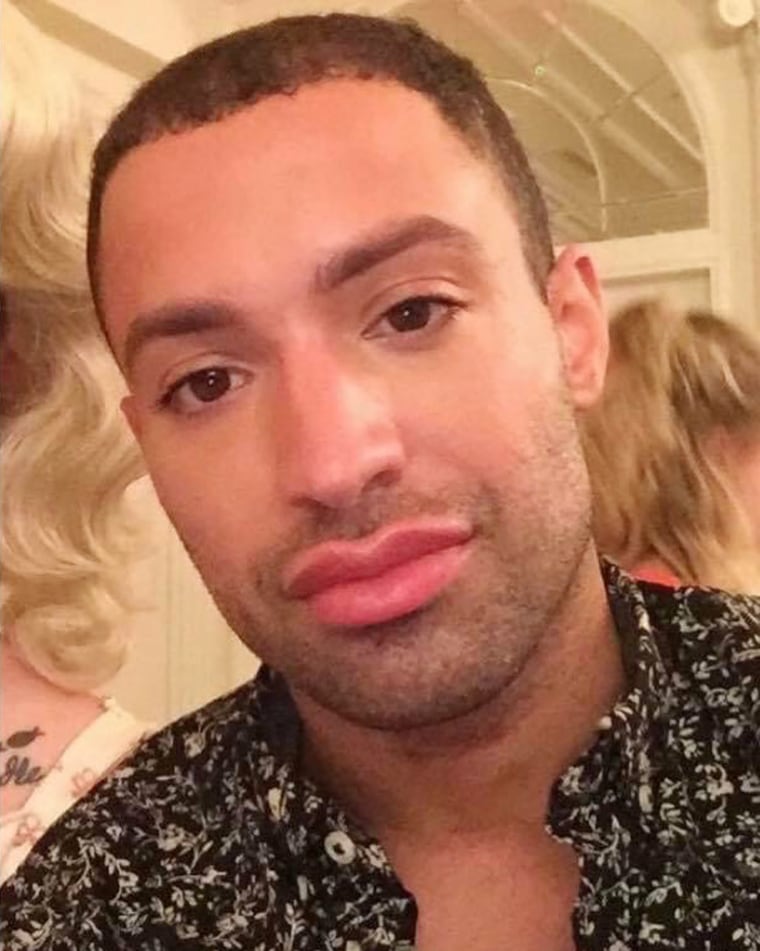
While Noel still has a lot of unanswered questions about his dads, he has learned a bit more because of the AIDS Memorial Instagram: Writer and artist Timothy Dean Lee, who follows the page and frequently comments on posts, knew Louis and Steven back in the day.
“When I read Noel’s tribute it was overwhelming,” Lee told NBC News via email. “It gave me answers to what had happened to Louis and Steven — and to the boys. I couldn’t stop crying.”
Lee had met Louis in the 1980s as a graduate student at New York University, where he was studying art therapy and child psychology. He’d often find himself in New York Family Court, where Louis was working as a social worker.
He’d also see Louis at meetings of the AIDS Coalition to Unleash Power, or ACT UP, and protests — and, on occasion, bump into Steven and Louis at the Paradise Garage “dancing the night away.”
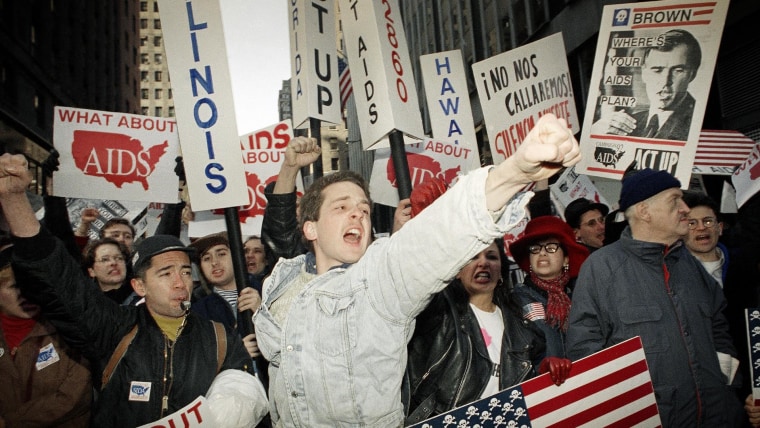
Flashback: Radical AIDS activist group ACT UP
“I remember when Louis told me that they were going through the process of adopting the boys,” Lee said. “I knew that adopting for a straight couple was challenging enough, but for a gay couple the challenges were all-consuming. But that certainly didn’t stop Louis and Steven.”
Being a social worker, Lee said, Louis knew the “ins and outs” of the system.
“He was driven. He knew the three boys needed a stable home and love, and he and Steven were more than willing to embrace them as part of their family.”
The last time Lee remembered seeing Louis was about 1990 on the street in the West Village.
“I asked him if he and Steven ever were able to adopt the boys,” he said. “He explained they were still officially foster parents, but they were determined to adopt all three.”
“Louis pulled out his wallet and showed a picture of the kids, saying ‘Yep, Tim, that’s my family.’”